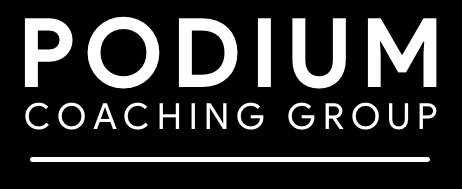What is the Podium Experience?
Today, the vast majority of coaching services are based on a coach-centered model, meaning that one coach is paired with many athletes. In most sports, the coach is focused on a single sport and is likely coaching several athletes. However, the club, team or program the coach belongs to, may also have several coaches where each coach has specialized skills based on specific domains of expertise.
Let’s look at running as an example. A cross country program may have a single coach to support an entire team. This can work since all of the runners are operating within the same discipline (i.e. long distance running). However, for a sport like Track and Field, there are often several coaches; each of whom provide expertise within a given domain. For example, there may be a long distance running coach and a sprint coach. Many track programs will also have other specialized coaches to support throwing, jumping and hurdles. In these examples, each coach has deep expertise in the domain in which they are focused. If the athlete spans multiple domains or disciplines, then the athlete would have multiple coaches. For example, a sprinter that also jumps or throws may have a sprint coach and other coaches to support throwing and jumping.
Coach-Centered Model
In the coach-centered model, the coach needs to have deep expertise across many different disciplines
However, the multi-sport world has largely not followed this model. Rather than one coach per discipline or domain, the common paradigm is to have one coach supporting all three domains; swim, bike and run. Furthermore, other domains that are arguably just as important to achieve optimal performance are often neglected or also supported by a single coach. These include nutrition, mental health and strength.
The Podium Coaching “Pod” Solution
At Podium Coaching Group, we recognize sport science and sport-specific training (endurance, strength, function, skills, etc) is becoming increasingly more complex and therefore deep expertise in each domain is required to unlock an athlete’s full potential. To address this, PCG deploys an athlete-centered model where each athlete is supported by a team (pod) of coaches. This model allows for coaches with unique skills and deep expertise across six predefined domains to work collaboratively together to drive athlete outcomes.
Athlete-Centered Model
In the Athlete-Centered model, the athlete is supported by a “pod” of coaches - each of which is an expert across each of the six domains.
Athletes are assigned to a “head” coach that advocates and coordinates the input of other domain-specific coaches at scheduled times throughout the annual training plan cycle and as needed. This model ensures that athletes have a single point of contact where a deep coach-to-athlete relationship can be established while providing a team-based approach to the athlete’s development.
The Athlete-Centered Process
Head coaches serve as the day-to-day primary contact for the athlete while working directly with their coaching pod during the following athlete phases:
Athlete Onboarding and Orientation
Every new athlete has a completed profile which includes training history, race history, metabolic assessment via PCG partners like Human Powered Health and INSCYD in addition to sport-specific assessments which are reviewed prior by the team as part of the athlete onboarding process.Annual Training Plan Reviews
Each athlete is reviewed annually to assess progress, align on new goals and drive annual training plan development.Athlete Check-Ins
At least quarterly, the head coach brings an athlete to an athlete review meeting where the coaching team can assess and discuss athlete progress, major changes to plans, upcoming races, development opportunities, skills assessments, etc. This ensures the athlete is getting personalized and continuous feedback from the coaching team throughout each training block.
In addition, head coaches can invoke the coaching team (or a subset of the team) as needed at any point. Common scenarios that drive these ad-hoc team meetings include injuries, preparation for major events (e.g. nationals, worlds, test events, etc) and athletes that need unique support beyond the expertise of the head coach.
This “pod” concept has been in use by PCG and has delivered incredible results. Here’s a few highlights:
Reese Vannerson: Reese hit podium in 3rd place at Junior Worlds last year, claimed 7th this year and was invited to race in Super League on team Warriors.
Luke Anthony: In 2023, Luke has claimed the title as North American champion, placed 8th in Junior Worlds and 2nd in U.S. Nationals and is an alternate for the Warriors Super League team
Carter Stuhlmacher: In 2023, has racked up impressive results including 6th at Junior Worlds, took the top step as Junior National Champion and is also competing in Super League on team Warriors.
If you are looking to maximize your performance, join us!


